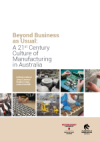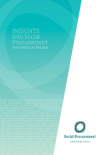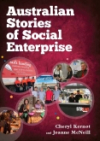| Beyond Business as Usual: A 21st Century Culture of Manufacturing in Australia This report is based on in-depth research with ten manufacturers. It finds that along with operating dynamic and viable businesses these manufacturers are fostering a culture of just and sustainable manufacturing that is helping to tackle the social and environmental challenges of the 21st century.
The manufacturers include public corporations and cooperatives, and range from the privately-owned engineering firm, Varley Group, which is headquartered in the Hunter region and has been operating since 1886 to the not-for-profit social enterprise and clothing manufacturer, The Social Outfit, which was established in Newtown in Sydney in 2014. 
|
| Articulating value in cooperative housing: International and methodological review This research report was commissioned by the Australian Cooperative Housing Network, comprising Common Equity NSW, Common Equity Housing Ltd, the Federation of Housing Collectives, and Common Equity Housing South Australia. The report details the evidence for identified benefits of cooperative housing, the variables of business models in operation, and core enabling factors. On that basis, the report then presents a framework for a research methodology to capture primary data on the generation of value by rental cooperatives in Australia. It then presents an outline of the Australian context and sector and a review of cooperative housing sectors in selected countries. The country profiles are followed by a top-level overview of major global trends in cooperative housing. A conclusion and references complete the report. |
| Economic Geography, Manufacturing and Ethical Action in the Anthropocene: A Rejoinder We are thrilled by Vicky Lawson’s deeply appreciative response to the Roepke Lecture and the written article. In her response, Vicky does more than we could ask for by inviting economic geographers to think with us about ways of reworking manufacturing (and other economic activities) that center on care for the well-being of people and of the planet. Vicky goes to the heart of our project by highlighting the importance we place on looking for the ethical openings that arise in the current context of climate change and growing socioeconomic inequality. As she identifies, part of our armory includes tactics of attending to already existing possibilities that are hidden from view and reframing understandings of what an economy is for. |
| Roepke Lecture in Economic Geography—Economic Geography, Manufacturing, and Ethical Action in the Anthropocene In a world beset by the problems of climate change and growing socioeconomic inequality, industrial manufacturing has been implicated as a key driver. In this article we take seriously Roepke’s call for geographic research to intervene in obvious problems and ask can manufacturing contribute to different pathways forward? We reflect on how studies have shifted from positioning manufacturing as a matter of fact (with an emphasis on exposing the exploitative operations of capitalist industrial restructuring) to a matter of concern (especially in advanced economies experiencing the apparent loss of manufacturing). Our intervention is to position manufacturing for the Anthropocene as a matter of care. |
| Public Declaration: Just and Sustainable Manufacturing in Australia This public declaration was one outcome from the Reconfiguring the Enterprise Research Project. It was written and signed by the research team (Katherine Gibson, Stephen Healy, Jenny Cameron and Joanne McNeill) and the participating Australian manufacturers. The declaration was widely distributed, including to state and Federal members of parliament. It has contributed to ongoing discussions about the direction of Australian manufacturing in the 21st century. |
| Classifying social enterprise models in Australia This paper aims to document the nature of social enterprise models in Australia, their evolution and institutional drivers. Design/methodology/approach: The paper draws on secondary analysis of source materials and the existing literature on social enterprise in Australia. Analysis was verified through consultation with key actors in the social enterprise ecosystem. Findings: With its historical roots in an enterprising non-profit sector and the presence of cooperative and mutual businesses, the practice of social enterprise in Australia is relatively mature. Yet, the language of social enterprise and social entrepreneurship remains marginal and contested. The nature of social enterprise activity in Australia reflects the role of an internally diverse civil society within an economically privileged society and in response to an increasingly residualised welfare state. Australia’s geography and demography have also played determining roles in the function and presence of social enterprise, particularly in rural and remote communities. Originality/value: The paper contributes to comparative understandings of social enterprise and provides the first detailed account of social enterprise development in Australia. |
| Community Recycling Enterprises NSW Impact Measurement Project final report This project was funded by the NSW Office of Environment and Heritage (OEH), and delivered by the Centre for Social Impact (CSI) Swinburne in partnership with Community Recycling Network Australia (CRNA) and Resource Recovery Australia. The project aims were: to improve understanding of how the environmental and social impacts of NSW-based community recycling enterprises are currently measured; to use this information to suggest some common indicators against which they could more effectively document and report on their performance in these areas; and to consider the implications of this work for sustainability-focused social enterprises more broadly. The research undertaken to inform the report included: an online survey of NSW-based CREs; a consultation workshop with CREs and CRE stakeholders; 11 telephone interviews with CRE representatives and core CRE stakeholders; and secondary research exploring relevant initiatives and reporting practices of CRE-style entities in other countries. |
| Enabling social innovation assemblages: Strengthening public sector involvement Public sector interest in social innovation is rapidly growing around the world. However, only recently has substantial empirical research emerged to support practice. Through combining Community Economies research methods with emerging new public governance literature, this thesis makes a unique contribution to the field. A language politics is developed, based on two experimental conceptual frameworks. Using these, social innovation assemblages are explored, with a particular focus on social procurement relationships. Openings for performing new kinds of economy are established, offering a counter to ‘fast policy’ approaches and contributing to decentring prevailing discourses of intractable ‘wicked problems’. |
| Generating social value: Framing the value question in commissioning & social procurement |
| The Legal Roots of a Sustainable & Resilient Economy: New Kinds of Legal Entities, New Kinds of Lawyers? |
| Where are the Community Enterprise Lawyers? Towards an Effective Ecosystem of Legal Support For Small-Scale Sustainable Economy Initiatives in Australia This discussion paper documents gaps in professional legal support for small-scale sustainable economy initiatives (SSEIs) in Australia. It draws on (Section 2 and Appendices) data from multiple sources, including a three-year research project on the legal and regulatory support structures for SSEIs, two small surveys of social enterprise, a review of eight cognate initiatives, a review of law firm websites and direct contact with nine social enterprise-related capacity building programs around Australia.The paper first discusses what we mean by SSEIs and their relevance to current debates about innovation, the new economy and the need to respond to urgent economic and environmental challenges (Section 3). Broadly, SSEIs are small-scale enterprises that place a high value on economic democracy, social relationships and community development in their organisational design and provide services that are directly relevant to environmental goals. The definition of an identifiable ‘sector’ in this context remains diffuse, in part because the legal, financial and organisational structures of our current economy do not sit comfortably with these types of initiatives.The paper then identifies existing patterns of support and their limitations (Section 4), especially when understood in the context of the distinctive needs of SSEIs (Section 5). Many of these limitations are shaped by assumptions of a divide between not-for-profit and for-profit legal structures, which maps onto a related gulf between pro bono advice and expensive commercial advice. The paper seeks to transcend this divide and work towards a vision of legal advice and support as a common pool resource.There are three main sources of existing professional legal support for SSEIs. Some law firms provide advice to social enterprises, but most focus on not-for-profit and limited pro bono advice. However, recently some smaller firms are emerging with more of a creative and hybrid focus. There are also a number of cognate initiatives that service social enterprise specifically and in some cases SSEIs, though they have various limitations of scope and resources. Finally, social enterprise capacity-building programs broker select initiatives to access legal advice, sometimes at ‘low-bono’ fee levels.Overall, pro bono legal practitioners appear to have access to well-developed networks to help them identify each other and to share knowledge. In contrast, those attempting to build their expertise and skills around working with social enterprises and SSEIs report difficulty in identifying a network and limited opportunities to share knowledge and expertise around the specific needs of SSEIs. |
| Social Enterprise in Australia: Concepts and Classifications, ICSEM Working Papers, No. 30 This paper is part of a series of Working Papers produced under the International Comparative Social Enterprise Models (ICSEM) Project. Launched in July 2013, the ICSEM Project (www.iap- socent.be/icsem- project) is the result of a partnership between an Interuniversity Attraction Pole on Social Enterprise (IAP-SOCENT) funded by the Belgian Science Policy and the EMES International Research Network. It gathers around 200 researchers—ICSEM Research Partners—from some 50 countries across the world to document and analyze the diversity of social enterprise models and their eco- systems. As intermediary products, ICSEM Working Papers provide a vehicle for a first dissemination of the Project’s results to stimulate scholarly discussion and inform policy debates. A list of these papers is provided at the end of this document. |
| Book review: Routledge Companion to Alternative Organization |
| Making and sharing the commons: Reimagining 'the West' as Riverlands, Sydney through a dialogue between design and ethnography Scholars from the social sciences and humanities are increasingly seeking to improve the relevance and social impact of their research beyond the academy. In this context, 'designerly' thinking and methods are being drawn on to inform social change agendas, and a range of new relationships and collaborations are forming around this node of activity. This article critically reflects on this trajectory through a dialogue between ethnography, design and theoretical principles from anthropology and human geography. We draw on the example from a workshop during the ICD Symposium and our response to the challenge of reimagining Western Sydney as 'Riverlands, Sydney'. We found that various conflicting descriptions and residents' experiences of Western Sydney warranted a critical take on the constitution of a 'problem' of Western Sydney and the possible solution as 'Riverlands, Sydney'. We argue that a diverse mix of experiential and theoretical 'knowing' is needed to tackle locally embedded opportunities and challenges, and that local knowledge must 'sit at the table' on an equal footing with design practice and academic analysis. The article outlines points of contact that could be created to involve local people and organisations as experts in a hypothetical, collectively imagined project, and how this could lead to their active engagement as co-researchers, co-designers and co-producers in making and sharing commons. The article demonstrates how this type of critical and collaborative design framework incorporates theoretical and ethnographic dialogues, and how this approach provides the entry points for going beyond stale policy-based responses to contemporary societal challenges. Using a combination of experiential and theoretical tools to look beneath the surface of the already constituted 'question' or 'problem' allows possible re-framings to be explored before responses are developed. We argue that ethnographic understandings developed in dialogue with design, which are rooted in a perspective that takes seriously local ways of knowing as forms of equal expertise, can enable this. |
| Insights into Social Procurement: From Policy to Practice This document provides insights into current social procurement policy and practice within the public sector in Australia. It draws from interviews with representatives of three State Government departments, and from resource materials previously produced.
The report includes case studies which provide snapshots of different ways that government entities are utilising both direct and indirect social procurement strategies to support the implementation of local economic development policies and programs. Through harnessing and targeting their purchasing power they are engaging residents and supporting local small enterprise growth and stability, fostering the economic capacity of a local area so as to improve quality of life for local residents.
Overall, the report finds that there is no one best way to ‘do’ social procurement. Nevertheless, a common theme is that involving people who have a passion for more effective and innovative approaches to procurement, and / or for the specific social issue to be targeted, is important at all stages of the process. This type of committed leadership - at the political, executive and technical levels - plays a critical role in designing and implementing successful strategies. 
|
| Enabling Social Innovation Opportunities for Sustainable Local and Regional Development Competitively selected paper presented at the inaugural Social Frontiers: The Next Edge of Social Innovation Research conference in London, November 2013. |
| More than Numbers: A Shared Value Approach to Social Impact Assessment Article for the Planning Institute of Australia (NSW) journal |
| How do Public Policy and Programs Enable Social innovation Activities that Contribute to More Sustainable Forms of Local and Regional Development? Paper on doctoral research in process. |
| Generating Social Value Through Public Procurement: The Case of Parramatta City Council Case study included in OECD report. |
| Through Schumpeter: Public Policy, Social Innovation and Social Entrepreneurship |
| In Pursuit of Social Impact: Towards a 'Joint-stewardship' Approach to Financier Relationships in Social Entrepreneurship and Social Enterprise |
| Australian Stories of Social Enterprise Non-academic book exploring 33 Australian social enterprises, based on in-depth interviews.

|
| How the Public Sector Can Support Growth and Sustainability in Social Enterprise Activity Report on Churchill Fellowship study tour to the UK, Canada and the US. |



